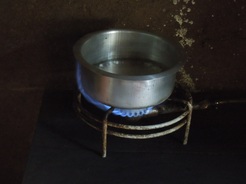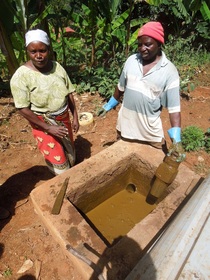Constructing biogas plants

Cooking with gas reduces the health hazard
Since the start of the "Mkume Sub-Village: Farms for the Future" project in 2012, the local community has worked together with international volunteers to create a public learning center in one village, as well as pipe infrastructure for irrigation farming during the region’s dry season, and contour farming projects to reduce soil erosion. The next phase of the project is the installation of 10 domestic biogas plants for local families. The biogas is produced in an eco-friendly way through cow-dung manure.
People in rural Tanzania still cook over an open fire, which means that they have to collect wood from the highly threatened surrounding forests. The dependency on firewood for cooking contributes to the steady growth of deforestation in the area, with a reported 75% to 90% loss of original forest in 5 of the 12 mountain ranges making up the Eastern Arc, which includes the Pare Mountains, an incredible source of biodiversity in the region. It is therefore important to address this issue, providing a sustainable alternative to firewood for everyday household needs. We must act quickly to save what remains of these forests and also plant trees through tree nurseries.
People in rural Tanzania still cook over an open fire, which means that they have to collect wood from the highly threatened surrounding forests. The dependency on firewood for cooking contributes to the steady growth of deforestation in the area, with a reported 75% to 90% loss of original forest in 5 of the 12 mountain ranges making up the Eastern Arc, which includes the Pare Mountains, an incredible source of biodiversity in the region. It is therefore important to address this issue, providing a sustainable alternative to firewood for everyday household needs. We must act quickly to save what remains of these forests and also plant trees through tree nurseries.

Cow-dung manure is mixed with water
The construction of 10 biogas plants in the area will reduce deforestation caused by the need for firewood, relieve women and children from the tiresome and long work of collecting firewood, and the time spent on cooking. This will allow particularly women to involve themselves in other economic activities, thus improving their families' situations and allowing children to attend school. Also, biogas emits no smoke, and is very clean thereby limiting the family members being affected by the smoke for their respiratory systems and eyes or getting ill in their abdominal systems.
Through experience we know that in this area it is not enough to place limits on firewood per family or educate people about planting trees. We must provide them with a more sustainable replacement for firewood. Biogas is particularly feasible here because most families already have cows which provide enough manure to power stoves for them if the biogas infrastructure is installed.
Our aim:
We hope to start to construct biogas facilities for 10 families in July 2013, but also raise awareness in the wider area of the potential of cow-dung manure and this simple technology can improve the livelihood conditions and protect local forests through the availability of more sustainable energy. Learn more about the project on the following website: http://kihobiogas.weebly.com/index.html
Also, a crowdfunding campaign was started on Indiegogo to raise $2,000 in 60 days.
Please help us to support the project:
http://www.indiegogo.com/projects/kilimanjaro-hope-organization-biogas-project/x/3016717
Through experience we know that in this area it is not enough to place limits on firewood per family or educate people about planting trees. We must provide them with a more sustainable replacement for firewood. Biogas is particularly feasible here because most families already have cows which provide enough manure to power stoves for them if the biogas infrastructure is installed.
Our aim:
We hope to start to construct biogas facilities for 10 families in July 2013, but also raise awareness in the wider area of the potential of cow-dung manure and this simple technology can improve the livelihood conditions and protect local forests through the availability of more sustainable energy. Learn more about the project on the following website: http://kihobiogas.weebly.com/index.html
Also, a crowdfunding campaign was started on Indiegogo to raise $2,000 in 60 days.
Please help us to support the project:
http://www.indiegogo.com/projects/kilimanjaro-hope-organization-biogas-project/x/3016717
